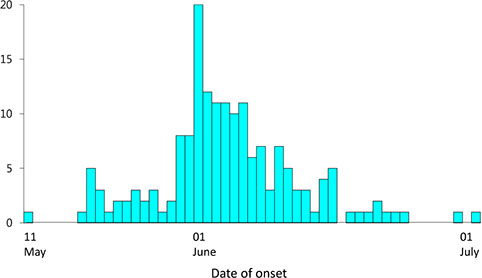Pediatr Infect Vaccine.
2015 Dec;22(3):131-135. 10.14776/piv.2015.22.3.131.
Middle East Respiratory Syndrome Outbreak in Korea, 2015
- Affiliations
-
- 1Department of Pediatrics, Seoul National University College of Medicine, Seoul, Republic of Korea. eunchoi@snu.ac.kr
- KMID: 2315676
- DOI: http://doi.org/10.14776/piv.2015.22.3.131
Abstract
- Since April 2012, more than 1,600 laboratory-confirmed human infections with Middle East Respiratory Syndrome Coronavirus (MERS-CoV) have been reported, occurring primarily in countries in the Arabian Peninsula; the majority in Saudi Arabia. The MERS outbreak in Korea, which began in May 2015 through the importation of a single case who had recently traveled to Bahrain, the United Arab Emirates, Saudi Arabia, and Qatar. As of November 28th, 186 secondary and tertiary cases had been reported; 38 deaths, mainly associated with underlying chronic illnesses, were reported. One case was exported to China and has been recorded as the first MERS case in China. Thirty-seven confirmed cases were associated with the index case, who was hospitalized from May 15 to May 17. Emergency room at one of the nation's largest hospitals had been affected by hospital-to-hospital and intra-hospital transmissions of MERS-CoV, resulting in an outbreak of 90 infected patients. The vast majority of 186 confirmed cases are linked to a single transmission chain associated with health facilities. The median age of patients is 55 years, with a range of 16 to 87 years. The majority (61%) of patients are men. Twenty-five (14%) of the cases involve healthcare workers. The overall median incubation period was six days, but it was four days for secondary cases and six days for tertiary cases. There has been no evidence of airborne transmission and sustained human-to-human transmission in communities. Intensified public health measures, including contact tracing, quarantine and isolation of all contacts and suspected cases, and infection prevention and control have brought the MERSCoV under control in Korea. Since 4 July no new cases have been reported.
MeSH Terms
Figure
Reference
-
1. ProMed Mail: Novel coronavirus - Saudi Arabia: human isolate; Archive Number: 20120920.1302733. Accessed on November 28, 2015. http://www.promedmail.org/direct.php?id=20120920.1302733.2. Zaki AM, van Boheemen S, Bestebroer TM, Osterhaus AD, Fouchier RA. Isolation of a novel coronavirus from a man with pneumonia in Saudi Arabia. N Engl J Med. 2012; 367:1814–1820.
Article3. World Health Organization. Middle East Respiratory Syndrome coronavirus (MERS-CoV) – Republic of Korea. Accessed on October 26, 2015. http://www.who.int/csr/don/24-may-2015-mers-korea/en/.4. Azhar EI, El-Kafrawy SA, Farraj SA, Hassan AM, Al-Saeed MS, Hashem AM, et al. Evidence for camel-to-human transmission of MERS coronavirus. N Engl J Med. 2014; 370:2499–2505.
Article5. Assiri A, McGeer A, Perl TM, Price CS, Al Rabeeah AA, Cummings DAT, et al. Hospital outbreak of Middle East Respiratory Syndrome coronavirus. N Engl J Med. 2013; 369:407–416.
Article6. Guery B, Poissy J, el Mansouf L, Séjourné C, Ettahar N, Lemaire X, Vuotto F, et al. Clinical features and viral diagnosis of two cases of infection with Middle East Respiratory Syndrome coronavirus: a report of nosocomial transmission. Lancet. 2013; 381:2265–2272.
Article7. Assiri A, Al-Tawfiq JA, Al-Rabeeah AA, Al-Rabiah FA, Al-Hajjar S, Al-Barrak A, et al. Epidemiological, demographic, and clinical characteristics of 47 cases of Middle East respiratory syndrome coronavirus disease from Saudi Arabia: a descriptive study. Lancet Infect Dis. 2013; 13:752–761.
Article8. Memish ZA, Zumla AI, Assiri A. Middle East Respiratory Syndrome coronavirus infections in health care workers. N Engl J Med. 2013; 369:884–886.
Article9. World Health Organization. Accessed on October 25, 2015. http://www.who.int/emergencies/mers-cov/25-october-2015-mers-epicurve.png?ua=1.10. Korea Centers for Disease Control and Prevention. Accessed on November 26, 2015. http://mers.go.kr/mers/html/jsp/main.jsp.11. Korea Centers for Disease Control and Prevention. Middle East Respiratory Syndrome Coronavirus Outbreak in the Republic of Korea, 2015. Osong Public Health Res Perspect. 2015; 6:269–278.12. Centers for Disease Control and Prevention. Accessed on November 26, 2015. http://www.cdc.gov/coronavirus/mers/infection-prevention-control.html.13. Wang Y, Liu D, Shi W, Lu R, Wang W, Zhao Y, et al. Origin and possible genetic recombination of the Middle East Respiratory Syndrome coronavirus from the first imported case in China: Phylogenetics and coalescence analysis. MBio. 2015; 6:e01280–e01215.
Article
- Full Text Links
- Actions
-
Cited
- CITED
-
- Close
- Share
- Similar articles
-
- An Unexpected Outbreak of Middle East Respiratory Syndrome Coronavirus Infection in the Republic of Korea, 2015
- The Same Middle East Respiratory Syndrome-Coronavirus (MERS-CoV) yet Different Outbreak Patterns and Public Health Impacts on the Far East Expert Opinion from the Rapid Response Team of the Republic of Korea
- Costly Lessons From the 2015 Middle East Respiratory Syndrome Coronavirus Outbreak in Korea
- 2015 MERS outbreak in Korea: hospital-to-hospital transmission
- The Korean Middle East Respiratory Syndrome Coronavirus Outbreak and Our Responsibility to the Global Scientific Community



